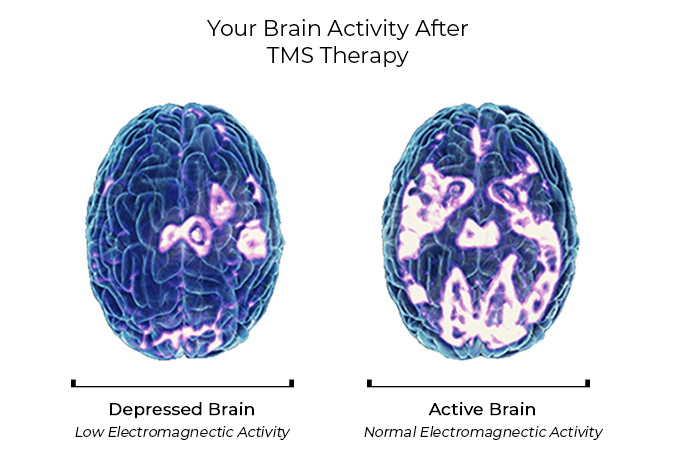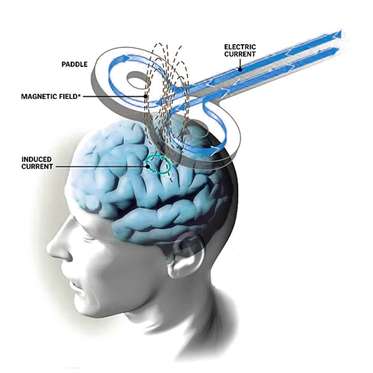What is TMS?

This treatment is mostly indicated for depression but also works for anxiety, obsessive-compulsive disorder, and trauma. The relief is chiefly caused by the increase in functional connectivity and synaptic plasticity. With all the technicalities aside, this could work for you too.
TMS is a simple and safe procedure that is approved by the Food and Drug Administration. Your doctor will recommend this type of treatment if other forms of therapy and medication will not work anymore.
How TMS Works
During a therapy session, the doctor will place an electromagnetic coil on your forehead, accurately and strategically placed against your scalp. This will deliver painless magnetic pulses to stimulate the nerve cells in specific regions of your brain. The instant effect is mood improvement. Patients and doctors would usually notice this effect first before anything else.
TMS aims to activate parts of the brain with low depression activities. This stimulation causes positive mood changes. Every doctor employs various techniques in performing this therapy. However, the standard procedure is straightforward, and you have nothing to worry about.
What to Expect During TMS Sessions

TMS is an outpatient procedure — this means that you’ll be discharged after the session. This can be done in a hospital or in your doctor’s office. Before the treatment, you will be requested to remove jewelry and items from yourself or your pocket that contains metal. This may include credit cards or even coins.
You will also be asked to wear earplugs to protect your ears from loud noises or sounds. Our TMS therapy in West Palm Beach follows the standard procedures and will ensure that you are comfortable enough to undergo the same.
How the Doctor Prepares for TMS Sessions
During the consultation, your doctor will measure your head for the placement of the TMS coil. They will also need to measure your motor threshold. Your motor threshold is the amount of power needed to cause your thumb to twitch. This measurement will vary for each person. Once all of these are completed, your doctor will know how to perform the therapy.
Treatment Frequency and Schedules
This may also vary per person, but the standard frequency of TMS treatments is five daily treatments every three to six weeks. Every treatment course consists of 20 to 30 sessions. The doctor will determine the amount of hertz and pulses needed by each person. At Florida Outpatient Services, we always see to it that the treatment prescribed matches the specific needs of the patient.
Why You Should Try TMS Therapy
If you or a loved one needs alternative treatment for certain conditions, you can always count on our TMS therapy in Boynton Beach to provide you with the best treatment. Below are some of the benefits of TMS therapy one should know about.
It Is Non-Invasive
TMS therapy will be performed outside your body. This means that electrode implantation and surgery are not necessary to get treated. The doctor will simply attach the TMS coil to your scalp, and that’s it. You won’t have to worry about post-recovery treatment as you will not need one after getting discharged.
It Does Not Require Anesthesia or Sedation
If you’re scared of needles, you won’t have to worry about undergoing TMS therapy. You won’t be sedated or administered anesthesia before the procedure. In fact, you can function normally afterward as if you have not undergone therapy at all. However, it’s best to tell your doctor if you’re feeling something strange after the procedure.
It Does Not Have Major Side Effects
Antidepressants are notorious for causing undesirable effects on a person’s body. Some of them include apathy, memory loss, sexual dysfunction, and insomnia, among others. This can be felt throughout the whole duration of the medication.
Meanwhile, TMS therapy, while not completely side-effect free, only causes minor discomforts such as nausea, slight dizziness, or a subtle scalp discomfort. And this can only last for minutes after the session. This is why we tell our clients to not worry because they are in good hands when undergoing TMS therapy in Florida at our clinic.
Send Us a Message
If you wish to learn more or have questions about TMS therapy, feel free to call us. We want to answer all of your questions and make you comfortable enough to undergo the right treatment for your needs. Our TMS therapy in West Palm Beach is also open and available for calls. Do not be afraid to try and explore the right treatment for yourself or your loved ones. We will walk with you hand-in-hand until your recovery. Speak with us today about any questions you may have.
